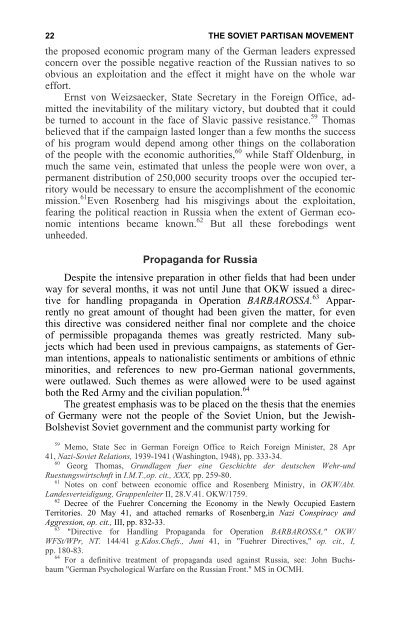the soviet partisan movement 1941-1944 by edgar m. howell
the soviet partisan movement 1941-1944 by edgar m. howell
the soviet partisan movement 1941-1944 by edgar m. howell
Create successful ePaper yourself
Turn your PDF publications into a flip-book with our unique Google optimized e-Paper software.
22 THE SOVIET PARTISAN MOVEMENT<br />
<strong>the</strong> proposed economic program many of <strong>the</strong> German leaders expressed<br />
concern over <strong>the</strong> possible negative reaction of <strong>the</strong> Russian natives to so<br />
obvious an exploitation and <strong>the</strong> effect it might have on <strong>the</strong> whole war<br />
effort.<br />
Ernst von Weizsaecker, State Secretary in <strong>the</strong> Foreign Office, admitted<br />
<strong>the</strong> inevitability of <strong>the</strong> military victory, but doubted that it could<br />
be turned to account in <strong>the</strong> face of Slavic passive resistance. 59 Thomas<br />
believed that if <strong>the</strong> campaign lasted longer than a few months <strong>the</strong> success<br />
of his program would depend among o<strong>the</strong>r things on <strong>the</strong> collaboration<br />
of <strong>the</strong> people with <strong>the</strong> economic authorities, 60 while Staff Oldenburg, in<br />
much <strong>the</strong> same vein, estimated that unless <strong>the</strong> people were won over, a<br />
permanent distribution of 250,000 security troops over <strong>the</strong> occupied territory<br />
would be necessary to ensure <strong>the</strong> accomplishment of <strong>the</strong> economic<br />
mission. 61 Even Rosenberg had his misgivings about <strong>the</strong> exploitation,<br />
fearing <strong>the</strong> political reaction in Russia when <strong>the</strong> extent of German economic<br />
intentions became known. 62 But all <strong>the</strong>se forebodings went<br />
unheeded.<br />
Propaganda for Russia<br />
Despite <strong>the</strong> intensive preparation in o<strong>the</strong>r fields that had been under<br />
way for several months, it was not until June that OKW issued a directive<br />
for handling propaganda in Operation BARBAROSSA. 63 Apparrently<br />
no great amount of thought had been given <strong>the</strong> matter, for even<br />
this directive was considered nei<strong>the</strong>r final nor complete and <strong>the</strong> choice<br />
of permissible propaganda <strong>the</strong>mes was greatly restricted. Many subjects<br />
which had been used in previous campaigns, as statements of German<br />
intentions, appeals to nationalistic sentiments or ambitions of ethnic<br />
minorities, and references to new pro-German national governments,<br />
were outlawed. Such <strong>the</strong>mes as were allowed were to be used against<br />
both <strong>the</strong> Red Army and <strong>the</strong> civilian population. 64<br />
The greatest emphasis was to be placed on <strong>the</strong> <strong>the</strong>sis that <strong>the</strong> enemies<br />
of Germany were not <strong>the</strong> people of <strong>the</strong> Soviet Union, but <strong>the</strong> Jewish-<br />
Bolshevist Soviet government and <strong>the</strong> communist party working for<br />
59 Memo, State Sec in German Foreign Office to Reich Foreign Minister, 28 Apr<br />
41, Nazi-Soviet Relations, 1939-<strong>1941</strong> (Washington, 1948), pp. 333-34.<br />
60<br />
Georg Thomas, Grundlagen fuer eine Geschichte der deutschen Wehr-und<br />
Ruestungswirtschnft in I.M.T.,op. cit., XXX, pp. 259-80.<br />
61 Notes on conf between economic office and Rosenberg Ministry, in OKW/Abt.<br />
Landesverteidigung, Gruppenleiter II, 28.V.41. OKW/1759.<br />
62 Decree of <strong>the</strong> Fuehrer Concerning <strong>the</strong> Economy in <strong>the</strong> Newly Occupied Eastern<br />
Territories. 20 May 41, and attached remarks of Rosenberg,in Nazi Conspiracy and<br />
Aggression, op. cit., III, pp. 832-33.<br />
63<br />
"Directive for Handling Propaganda for Operation BARBAROSSA," OKW/<br />
WFSt/WPr, NT. 144/41 g.Kdos.Chefs., Juni 41, in "Fuehrer Directives," op. cit., I,<br />
pp. 180-83.<br />
64 For a definitive treatment of propaganda used against Russia, see: John Buchsbaum<br />
"German Psychological Warfare on <strong>the</strong> Russian Front." MS in OCMH.
















